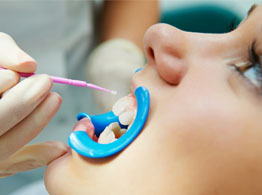FLUORIDES DENTAL SEALANTS
Fluoride is a mineral that occurs abundantly in a great variety of food as well as the water that we consume daily. Every_day, minerals are added to, and lost from a tooth’s enamel layer, mainly through two processes, referred to as demineralisation and remineralisation. Minerals are lost (demineralisation) from a tooth’s enamel layer when acids — formed from plaque bacteria and the sugar in the mouth — attack the enamel. Minerals such as fluoride, calcium, and phosphate are redeposited (remineralisation) to the enamel layer from the food and the water that we consume. Too much demineralisation without enough remineralisation to repair the enamel layer, leads to tooth decay.
Advantages of Fluoride
- Fluoride prevents tooth decay by making the tooth more resistant to acid attacks from plaque bacteria and sugar present in the mouth. It also reverses early decay.
- In children under 6 years of age, fluoride gets incorporated as permanent teeth develop, making it difficult for acids to demineralise the teeth.
- Fluoride also helps speed remineralisation, as well as disrupts acid production in the already germinated teeth of both children and adults.
A GENERALLY ASKED QUESTION IN THIS REGARD IS:
Q. In What Form Is Fluoride Available?
As mentioned, fluoride is found in the food and water that we consume. It can also be directly applied to the teeth through fluoridated toothpastes and mouth rinses. Mouthrinses containing fluoride in lower strengths are available over-the-counter,; though stronger concentrations require a Doctor’s prescription.
A Dentist can apply fluoride to the teeth as a gel, foam, or varnish in the clinic. These treatments sustain a much higher level of fluoride than the amount present in toothpaste and mouth rinses. In the process, varnishes are painted on the teeth; foams are put into a mouth guard, which is subsequently applied to the teeth for one to four minutes; gels are painted on or applied via a mouth guard. Fluoride supplements are also available in liquid and tablet form, and must be prescribed by your Dentist, Paediatrician, or family Doctor.

SEALANTS
The top surfaces of your teeth – where the chewing takes place – aren’t smooth and flat. They are crisscrossed with tiny hills and valleys – called pits and fissures. Some of the pits and fissures are so narrow that even a single bristle from your toothbrush can’t get deep enough to clean them out.
One of the methods of preventing cavities from developing in the pits and fissures is to seal them with a special varnish known as a pit and fissure sealant.
This is specially recommended for children as they find it difficult to keep their teeth clean through regular brushing, and in adults whose teeth have deep grooves and pits, if decay is to be prevented






























































